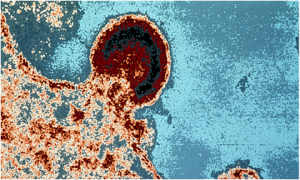By Nick Gubitosi February 4, 2010

A group of researchers lead by scientists from UCLA have identified a “broad spectrum” antiviral small molecule which targets the many envelope encased deadly viruses that exist today. This antiviral would fight enveloped viruses such as HIV, Ebola, and influenza, as well as viruses that haven’t even been discovered yet.
Dr. Benhur Lee, an associate professor at UCLA, was working with colleagues on 23 various pathogens when they discovered that this antiviral molecule, known as LJ001, only interfered with enveloped viruses through a mechanism which is still not fully understood.
This LJ001 molecule binds to both healthy and viral cells within the body, but only causes harm to the viral cells. Unlike the healthy cells in your body, viral cells lack the ability to repair themselves because they are not metabolically active. Therefore the damage done to the viral cells is permanent, while it is completely harmless to the healthy body cells.
Broad spectrum antivirals are hard to find, and usually accompanied with many shortcomings. One such antiviral, Ribavirin, targets RNA replication and is only effective against a few viruses, is too expensive for widespread use, and produces unwanted side effects. LJ001 targets viral structure, does not appear to be toxic, and can attack a large group of viruses, making LJ001 the first antiviral of its kind.
Viruses can differ from one another and even mutate as seen with HIV, making them extremely hard to fight off. Using an antiviral such as LJ001, which safely targets a feature common to an entire class of viruses, may be the potential answer to this problem.
See here for Press Release